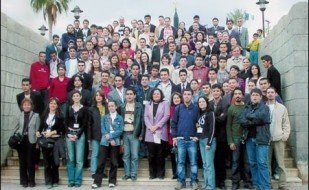Turkey must now focus on developing comprehensive policies for youth in order to ensure that the country has a healthy, educated, and skilled society to face the challenges of next 15 years and beyond, according to the 2008 Human Development Report for Turkey, which was released on Friday, 21 March.
The report, launched by the United Nations Development Programme (UNDP) and entitled Youth in Turkey, offers guidance on how employment, education and health policies for youth need to be reshaped to ensure that these policies are people-oriented and better prepare the country for the coming demographic challenges.
More than 12 million young people in Turkey
“Turkey’s young men and women are its next generation” writes Mahmood Ayub, UN Resident Coordinator and UNDP Representative for Turkey, in the foreword to the report. “They have the skills and ambitions, vision, and energy. But they need to be given opportunities to use these to the full.”
According to the 2007 Population Census, there are more than 12 million youth between the ages of 15-24 in Turkey, or 17.6 percent of the total population. Youth—which the report defines as people between 15 and 24 years of age—face a wide variety of challenges in Turkey.
High unemployment and gender discrimination
The unemployment rate for young people currently stands at 17-18 percent, almost twice the national average. Nearly 40 percent of youth – almost 5 million people – are idle, neither working nor attending school. Gender discrimination, curtailing the prospects of young women, has not been tackled with sufficient strength.
Turkey started a strong process of modernization under Mustafa Kemal Atatürk after 1923 but is lagging behind countries with comparable per capita income in the area of social policy. Turkey, the fastest growing country economically in its region, with one of the largest population of youth, needs to catch up with this international progress, the report says.
Need for value-adding jobs
A youth policy is important to ensure higher levels of human development, as defined by greater human choices. But it is also crucial in order to stave off some potentially crushing demographic challenges. The experience of East Asian countries demonstrates that a large youth cohort can help propel an economy to very high growth rates. However, the experience of other countries, for example in Latin America, has also shown that this positive outcome is by no means guaranteed. Thus it is crucial that the working-age population is indeed working in high value-adding jobs.
A 15-year window of opportunity
“The favourable ratio of young to old in the coming decades presents opportunities as well as challenges for the government,” says the report. “Turkey has a 15-year window of opportunity to prepare today’s youth for the challenges ahead. After 15 years, about 70% of Turkey’s population will be of working age and the working-age population will be increasing, though at a decreasing rate, until 2040.
This demographic transition, when population growth rate is declining while the working age population keeps rising is called “the demographic window of opportunity.” Such an episode is a one-off opportunity in a country’s history. If Turkey can give the right opportunities to its youth today, to invest in their education in order to prepare them for higher value-added jobs in the future, the demographic window of opportunity can be utilized effectively. But if this opportunity is mismanaged, unemployment, poverty, and social unrest may lie ahead.”
Education currently does not guarantee employment
During 2002-2006, when the average annual growth rate was 7.5 percent, the unemployment rate stubbornly remained unchanged around 10 percent. Population growth keeps outpacing employment growth and educated young people have difficulty finding jobs.
The report has used an unorthodox research approach. It is to a significant extent based on a comprehensive ‘State of Youth Survey’ which canvassed the views of 3,322 individuals aged 15-24 in 12 different regions of the country. It also included 24 focus group meetings with young people and four focus groups with adults.
Many young are "invisible"
The report says that special attention must be paid to those youth who are currently ‘invisible’. These include the 2.2 million young women who are neither in school nor seeking jobs, the physically handicapped, those who have given up hope of finding a job, juvenile delinquents, and street children.
Early childhood education
The report’s policy recommendations include enabling young people to access digital technology more easily, as well as ensuring that children from different socio-economic backgrounds have access to quality early childhood education. By focusing on early childhood education and ensuring that children from different socio-economic backgrounds have access to quality early childhood education, the government can ensure that children enter primary schools on a more equal level. A special focus on young people’s health is also needed, with proper investments in adolescent health.
Employment strategy needed
Employment policies should include increasing qualifications of the existing labour force through vocational education and job training; modernizing a number of traditional sectors with the help of high technology; encouraging the development of agro-industries; and boosting the numbers of IT companies run by the young.
Of utmost importance is finalizing an employment strategy, the report says. Identifying the specific features, constraints, and opportunities which matter most in terms of employment creation will be crucial. Policies need to be developed in a participatory manner that builds the trust of youth in political institutions, laying the foundations for sustained human development.
To download the report please click this link. (UNDP/AG)










